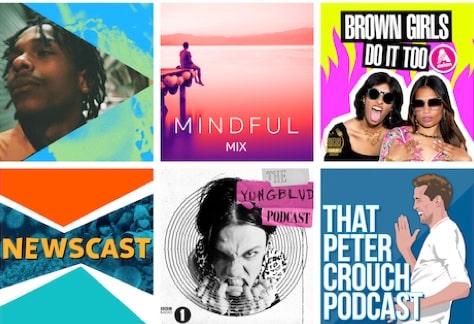Take the BBC, for example. The United Kingdom’s public broadcaster launched BBC Sounds, the successor to iPlayer Radio, in November 2018, as a response to this developing trend. BBC Sounds brings together all of the BBC’s radio, music and podcasts in one place, offering some 80,000 hours of audio via an app, its website, and voice-activated devices.
Jonathan Wall is BBC Sounds’ controller. He explains that the purpose of “Sounds” is to simplify access to its broad catalog of content for listeners and give them a more relevant and personalized experience.
Shaping the Industry
The other “raison d’être,” of course, is to keep BBC’s radio services competitive in a harsh market environment and to overcome one of radio’s huge obstacles — attracting younger ears while not losing traditional listeners. Wall believes the shifting audio market where global tech giants are looking to dominate, as well as changes in how people consume content — including podcasts and on-demand — have encouraged radio professionals to rethink their approach.
“Sounds is here to build on our rich program-making legacy — 98 years of it — and the quality of our archive and our famous radio shows is woven into it,” he said. “Its versatility aims to protect the future of our great live stations but recognizes the huge growth we are going to see in on-demand speech and music. It puts together those two worlds in one place.”
He points to the likes of Spotify, Apple and Amazon Music as the BBC’s main competitors. But he also fairly admits that these tech giants have brought constructive aspects to the industry. “Sure, they’re our main competitors, particularly for the time of younger pairs of ears,” he said.
“But they’ve also brought some significant positives from that button on your Apple iPhone and the RSS feed that opens out podcasting to all of us. And then the more recent explosion of Spotify spending hundreds of millions of dollars and putting extra ambition into speech and podcasting.” He cautions though that the audio industry’s future cannot lie in their hands alone. “We’ve got to shape our own destiny.”
All Ages
When asked if he thought this new approach could exclude the older generation, Wall says he doesn’t think so. He points out that it’s not just younger people who are changing the way they consume content, and everyone can still listen to radio via FM or DAB if they prefer.
“We know a lot of older listeners do use BBC Sounds to enjoy their favorite radio programs and some flagship radio programs, such as ‘The Archers’ and ‘Desert Island Discs’ from Radio 4, are some of the most popular on-demand radio programs on Sounds,” he said. “There would be a greater risk in not modernizing and finding ways to serve all audiences, including those who feel more distant from the BBC.”
As for the technical aspects, Lloyd Shepherd, BBC Sounds’ head of product, describes it as a system of “clients” (web, mobile app, TV and Alexa), which run off a core set of APIs called “Radio and Music Services” (“RMS”). He explains that they try to keep the clients as “thin” as possible, allowing them to make changes at the center and roll out across all the clients at once.
“This leaves the client teams to focus on the best user interface for their respective technologies,” Shepherd points out. “RMS is also responsible for taking input from other BBC systems — such as those that manage user sign-in, or that generate radio network schedules — and making that data available to the clients.”
The BBC takes its role as a companion and information provider seriously. In March, at the beginning of the pandemic, the broadcaster published a press release about its plan to “inform, educate and entertain during unprecedented times.”
Wall explains that during this time, the corporation made every effort to provide people with timely information and analysis about what was happening. It also provided audio to educate students and entertainment programming to help the audience simply get through each day.
Podcasting Too
“Back in March and April, we informed through podcasts like ‘Coronavirus Newscast,’ educated through quick turnaround content that literally helped children learn who couldn’t go to school. We also entertained through Louis Theroux. While he couldn’t make TV series, he could very much still make a podcast series. In addition, we curated music mixes to help our audience keep calm,” says Wall.
Podcasting is very much a part of the mix for Sounds. “The BBC was the first U.K. broadcaster to podcast when we made the program ‘In Our Time’ available on-demand in 2004. Now we commission specifically for the medium, which allows us to innovate in terms of tone, style, presenters and format, and have a range of podcasts for different audiences, particularly those who tend to listen on-demand and are less likely to switch on the radio,” he explains.
Meanwhile, there has been some speculation as to whether any “aspects of BBC Sounds are impeding the activity of for-profit firms in the same space and the U.K.” Ofcom, U.K.’s media regulator, recently stated it would carry out a public review on BBC Sounds market position. To this, Wall responds that the BBC has “always been open about our plans for BBC Sounds, and had relevant approvals from Ofcom for all key developments, including Radio 1 Dance.”
He says they’ll continue to liaise with the media watchdog and colleagues in commercial radio, but adds, “As listening habits change and global players like Spotify and Apple look to rule the market, we want BBC Sounds to be the best place for audiences to enjoy our content and a key way we champion and invest in the audio and music industry.”
Looking Ahead
Still, with over 240 million global podcast downloads on other platforms across the world during Q2 (April to June) this year, according to the BBC’s quarterly report, there are no signs of BBC Sounds slowing down. After the launch of the 24-hour streaming-only music radio station Radio 1 Dance in October, other initiatives include adding new features to its new music section as well as the introduction of a dedicated speech section to showcase more speech shows from BBC.
He says the corporation also continues to invest in music artists with support from big record labels, and are looking to create new formats. “In addition, we’ll continue to deliver a richer new package of podcasts, powered by the whole sector, the indie sector, as well as those brilliant in-house teams across the BBC. And yes, we’ll bring podcasts from outside the BBC into Sounds to really showcase the full range of British program making,” he said.
“We truly need to be more representative, and it requires intervention to really make a difference. Less talking, more action, faster.”
The broadcaster is also planning on launching a new scheme to find Sounds stars of the future. This targets black and Asian talent, people from diverse socio-economic backgrounds or people with disabilities. “Podcast presenters, writers or producers will be given money and exec producer support and mentoring to deliver their first podcast series, and then we’ll showcase that work on Sounds.”
On a larger scale, Wall reinforces the fact that the “move to digital listening means audio is now a global market, which gives listeners a huge amount of choice.” It also accentuates the reasons for BBC Sounds’ existence.
“It’s vital we have our own digital platform — our future can’t lie in the hands of global tech giants alone — and is why BBC Sounds matters to us, our audiences, and I think to our industry.”

